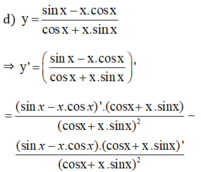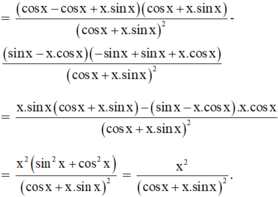Tính đạo hàm cấp hai của: a/ y=x.sinx b/ y= sinx c/ y= x.sin2x Giải chi tiết giúp mình với ạ

Những câu hỏi liên quan
Tính đạo hàm của các hàm số sau:
y
sin
x
-
x
.
cos
x
cos
x
+
x
.
sin
x
Đọc tiếp
Tính đạo hàm của các hàm số sau: y = sin x - x . cos x cos x + x . sin x
Tính đạo hàm cấp hai của hàm số
y
x
2
.
sin
x
A.
y
(
2
+
x
2
)
sin
x
+
2
x
.
cos
x
B.
y...
Đọc tiếp
Tính đạo hàm cấp hai của hàm số y = x 2 . sin x
A. y ' ' = ( 2 + x 2 ) sin x + 2 x . cos x
B. y ' ' = ( 1 - x 2 ) sin x + 6 x . cos x
C. y ' ' = ( 2 - x 2 ) sin x + 4 x . cos x
D. Đáp án khác
Ta có: y ' = 2 x . sin x + x 2 . cos x
y
'
'
=
2
sin
x
+
2
x
.
c
osx + 2x.cosx - x
2
s
inx
=
(
2
−
x
2
)
sin
x
+
4
x
.
cos
x
Chọn đáp án C
Đúng 0
Bình luận (0)
Giúp mình với ạ. Mọi người biết câu nào thì giải chi tiết giúp mình với (vì vào học chậm hơn các bạn nên ko hiểu gì hết ạ). Cảm ơn mn nhiều lắm.Tìm tập xác định của hàm sốa) yfrac{3sinx+5}{1+tan^2X}b) y frac{2-cotx}{1+cos2x}c) y frac{1}{cotx-sqrt{3}}d) y frac{sinx}{1-2sin^2x}
Đọc tiếp
Giúp mình với ạ. Mọi người biết câu nào thì giải chi tiết giúp mình với (vì vào học chậm hơn các bạn nên ko hiểu gì hết ạ). Cảm ơn mn nhiều lắm.
Tìm tập xác định của hàm số
a) y=\(\frac{3sinx+5}{1+tan^2X}\)
b) y= \(\frac{2-cotx}{1+cos2x}\)
c) y= \(\frac{1}{cotx-\sqrt{3}}\)
d) y= \(\frac{sinx}{1-2sin^2x}\)
a) ĐK: \(\cos x\ne0\)( vì tan x = sinx/cosx nên cos x khác 0)
<=> \(x\ne\frac{\pi}{2}+k\pi\); k thuộc Z
TXĐ: \(ℝ\backslash\left\{\frac{\pi}{2}+k\pi\right\}\); k thuộc Z
b) ĐK: \(1+\cos2x\ne0\Leftrightarrow\cos2x\ne-1\Leftrightarrow2x\ne\pi+k2\pi\Leftrightarrow x\ne\frac{\pi}{2}+k\pi\); k thuộc Z
=> TXĐ: \(ℝ\backslash\left\{\frac{\pi}{2}+k\pi\right\}\); k thuộc Z
c) ĐK: \(\hept{\begin{cases}\cot x-\sqrt{3}\ne0\\\sin x\ne0\end{cases}}\Leftrightarrow\hept{\begin{cases}x\ne\frac{\pi}{6}+k\pi\text{}\text{}\\x\ne l\pi\end{cases}}\); k,l thuộc Z
=>TXĐ: ....
d) ĐK: \(1-2\sin^2x\ne0\Leftrightarrow\cos2x\ne0\Leftrightarrow2x\ne\frac{\pi}{2}+k\pi\Leftrightarrow x\ne\frac{\pi}{4}+\frac{k\pi}{2}\)
=> TXĐ:...
TÍNH ĐẠO HÀM :
\(y=\left(1-3x\right).\sqrt{x-3}\)
\(y=\sqrt{2x+1}+\dfrac{1}{x+1}\)
\(y=\sqrt{\dfrac{1-x}{1+x}}\)
\(y=cos5x.co7x\)
\(y=cosx.sin^2x\)
\(y=tan^42x\)
\(y=\dfrac{2x}{sinx+cosx}\)
MỌI NGƯỜI GIÚP MÌNH VỚI Ạ MÌNH CẢM ƠN
1/ \(y'=\left(1-3x\right)'\sqrt{x-3}+\left(1-3x\right)\left(\sqrt{x-3}\right)'=-3\sqrt{x-3}+\dfrac{1}{2\sqrt{x-3}}\left(1-3x\right)\)
2/ \(y'=\dfrac{1}{\sqrt{2x+1}}-\dfrac{1}{\left(x+1\right)^2}\)
3/ \(y'=\dfrac{1}{2}.\sqrt{\dfrac{1+x}{1-x}}.\left(\dfrac{1-x}{1+x}\right)'=\dfrac{1}{2}\sqrt{\dfrac{1+x}{1-x}}.\dfrac{-2}{\left(1+x\right)^2}=-\sqrt{\dfrac{1+x}{1-x}}.\dfrac{1}{\left(1+x\right)^2}\)
4/ \(y'=\left(\cos5x\right)'.\cos7x+\cos5x.\left(\cos7x\right)'=-5\sin5x.\cos7x-7\cos5x\sin7x\)
5/ \(y'=\left(\cos x\right)'\sin^2x+\cos x\left(\sin^2x\right)'=-\sin^3x+2\sin x.\cos^2x\)
6/ \(y'=\left(\tan^42x\right)'=4.\tan^32x.\dfrac{2}{\cos^22x}\)
7/ \(y'=\dfrac{2\sin x+2\cos x-2x.\cos x+2x\sin x}{\left(\sin x+\cos x\right)^2}\)
Ờm, bạn tự rút gọn nhé :) Mình đang hơi lười :b
Đúng 0
Bình luận (0)
tìm đạo hàm cấp n của hàm y=cosx; y=tanx; y=cotx; y=sinx.
\(y=sinx\Rightarrow y'=cosx;y''=-sinx;y'''=-cosx\)
Bằng quy nạp toán học ; ta c/m được : \(y^{\left(n\right)}sinx=sin\left(x+n\dfrac{\pi}{2}\right)\)
Đúng 2
Bình luận (0)
Đạo hàm cấp hai của hàm số
y
3
4
x
4
-
2
x
3
-
5
x
+
sin
x
bằng biểu thức nào sau đây? A.
9
x
2
-
12
x
+
sin
x
B.
9
x
2
-
12...
Đọc tiếp
Đạo hàm cấp hai của hàm số y = 3 4 x 4 - 2 x 3 - 5 x + sin x bằng biểu thức nào sau đây?
A. 9 x 2 - 12 x + sin x
B. 9 x 2 - 12 x - sin x
C. 9 x 2 - 6 x - sin x
D. 9 x 2 - 12 x + cos x
y’= 3x3-6x2-5+cosx. Do đó y”= 9x2-12x-sinx. Chọn đáp án B
Đúng 0
Bình luận (0)
Đạo hàm của hàm số y = x . sin x bằng
![]()
![]()
![]()
![]()
a) Tính đạo hàm của hàm số \(y=\sqrt{sinx+cosx}\)
b) Hãy viết phương trình tiếp tuyến với đồ thị (C) của hàm số \(y=\dfrac{x+3}{x-1}\) biết tiếp tuyến vuông góc với đường thẳng \(y=\dfrac{1}{4}x+5\)
a.
\(y'=\dfrac{\left(sinx+cosx\right)'}{2\sqrt{sinx+cosx}}=\dfrac{cosx-sinx}{2\sqrt{sinx+cosx}}\)
b.
\(y'=\dfrac{-4}{\left(x-1\right)^2}\)
Tiếp tuyến vuông góc với \(y=\dfrac{1}{4}x+5\) nên có hệ số góc thỏa mãn \(k.\left(\dfrac{1}{4}\right)=-1\Rightarrow k=-4\)
\(\Rightarrow\dfrac{-4}{\left(x-1\right)^2}=-4\Rightarrow\left(x-1\right)^2=1\)
\(\Rightarrow\left[{}\begin{matrix}x=0\Rightarrow y=-3\\x=2\Rightarrow y=5\end{matrix}\right.\)
Có 2 tiếp tuyến thỏa mãn: \(\left[{}\begin{matrix}y=-4x-3\\y=-4\left(x-2\right)+5\end{matrix}\right.\)
Đúng 2
Bình luận (0)
Hàm số y=cos x.sin2x có đạo hàm là biểu thức nào sau đây?
![]()
![]()
![]()
![]()
Tìm đạo hàm của hàm số sau:
Y=sinx- x.cosx / cosx - x.sinx
\(y'=\frac{\left(sinx-x.cosx\right)'\left(cosx-x.sinx\right)-\left(sinx-x.cosx\right).\left(cosx-x.sinx\right)'}{\left(cosx-x.sinx\right)^2}\)
\(=\frac{\left(cosx-cosx+x.sinx\right)\left(cosx-x.sinx\right)-\left(sinx-x.cosx\right)\left(-sinx-sinx-x.cosx\right)}{\left(cosx-x.sinx\right)^2}\)
\(=\frac{x.sinx.cosx-x^2sin^2x+sin^2x-x.cosx.sinx+sin^2x-x^2cos^2x}{\left(cosx-x.sinx\right)^2}\)
\(=\frac{2sin^2x-x^2\left(sin^2x+cos^2x\right)}{\left(cosx-x.sinx\right)^2}=\frac{2sin^2x-x^2}{\left(cosx-x.sinx\right)^2}\)
Đúng 0
Bình luận (0)




















